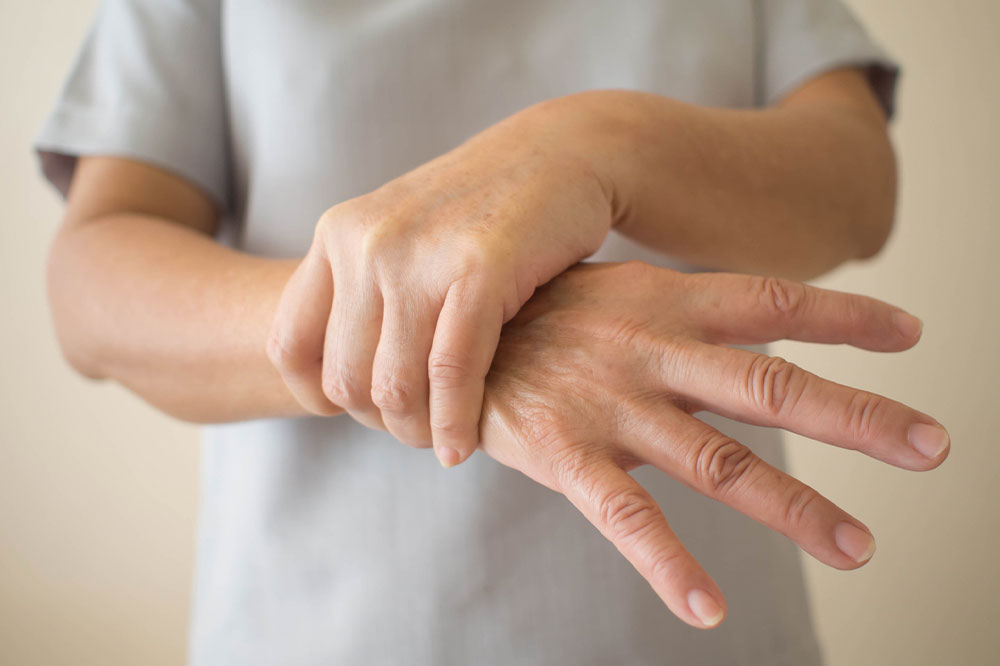
Hand tremor – Causes, symptoms, and management
Hand tremors are a neurological disorder that causes shaking or trembling movements in the hands. The condition can be mild or severe and occurs at rest or during directed motions. Though hand tremor is not life-threatening, in advanced stages, it can severely inhibit the ability to do basic tasks. It can be a sign of different medical and psychological conditions; therefore, it is important to find the cause of hand tremors and treat it.
Causes
Several reasons may cause shaking hands, such as:
Essential tremor
One of the most common neurological causes of hand tremor is essential tremor. People with this condition often have problems completing tasks such as writing, pouring, eating, drinking, etc.
Parkinson’s disease
Hand tremors can also occur as a result of Parkinson’s disease. The shaking or trembling of hands is at worst when the body is at rest, such as when walking with the arms on the side or while sitting. The tremor affects one side more than the other.
Enhanced physiological tremor
This tremor is caused due to muscle movement and impaired blood flow. There is shaking in both hands that come and go. Some triggers for enhanced physiological tremors include anxiety, overactive thyroid, caffeine use, stress, lack of sleep, etc.
Post-stroke tremor
Stroke can also cause a variety of trembling sensations, including hand tremors. Damage to the cerebellum can cause difficulty in coordinating a specific movement, such as reaching for an object. Irregular jerk-like motions may also happen in case of a rubral tremor.
Low blood sugar
Hypoglycemia or low blood sugar occurs when the body does not have enough glucose, leaving a person feeling shaky and jittery. Some other symptoms include rapid heartbeat, dizziness, sudden nervousness, and trouble thinking.
Symptoms
The symptoms of hand tremors can include:
Shaking movements in one or both hands
In most people, the involuntary tremor can affect both hands. Parkinson’s disease starts with one hand shaking rhythmically and may affect the other over time.
Finger movement
Hand tremors can cause movement of fingers that appear like pill rolling.
Shaking hands while at rest
Some people may feel tremors while at rest.
Tremors that occur with movement
People may also experience tremors with action or movement.
Tremors with or without anxiety
The tremors may occur even with or without anxiety or stress.
Diagnosis
If you are experiencing hand tremors, it is important to consult a healthcare provider. A physical exam and a review of the medical and family history will help diagnose. Although, the healthcare professional may order the following tests.
Neurological exam
This examination tests muscle strength, reflexes, balance, and speech that will help evaluate whether the tremor occurs when the muscles are at rest or in motion and its frequency.
Lab tests
Blood or urine samples may be taken to rule out certain conditions contributing to tremors, like thyroid or diabetes.
Diagnostic imaging
Diagnostic imaging helps determine whether the tremor is the result of damage to the brain. An electromyogram will help identify muscle or nerve problems.
Performance tests
These tests evaluate functional limitations such as writing, holding a cup, or drawing a spiral.
Treatment options
Although there is no cure for hand tremors, treatment options are available. These therapies depend on the cause of the shaking movements. If an underlying condition causes the tremor, treating that can help reduce or eliminate the hand tremor. However, trembling motions from stroke are not typically reversible.
When tremors do not respond to treatments or severely impact daily life, the following surgery may be necessary.
Deep brain stimulation
This is the most common form of surgery for hand tremors. A small neurostimulator device is placed under the skin in the upper chest, similar to the pacemaker. The device sends an electrical pulse that prevents tremors from occurring.
Certain lifestyle changes may also provide relief to people with hand tremors. These remedies include:
Avoiding triggers for physiological tremor
Enhanced physiologic tremors may be resolved by reducing caffeine and managing stress.
Relaxation techniques
When anxiety is causing hand tremors, relaxation techniques such as meditation and yoga can positively impact reducing tremors.
Hand and wrist exercises
Squeezing a stress ball and rotating the wrist in slow, circular motions may help reduce tremors.
Physiotherapy
Physiotherapy by trained professionals can also help reduce the intensity of hand tremors.
Adaptive technology
Hand tremors can interfere with many tasks, which may help to use adaptive technology like weighted utensils and gloves.
If you are experiencing hand tremors, seek professional help to prevent the worsening of the medical condition. Even when the shaking movements are not harmful, it is essential to manage them to minimize their impact on the quality of life.




